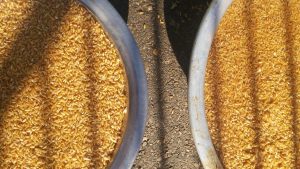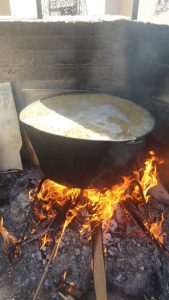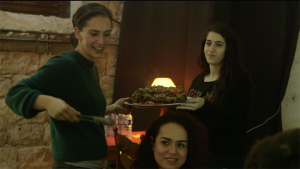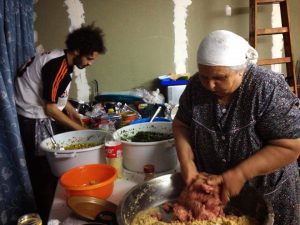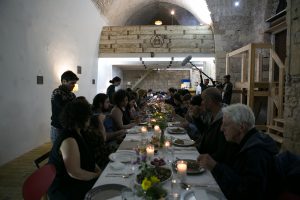Family Dinners Project Part 5 of 6
Food has always been a representation of class, time, and power. It creates a unique atmosphere conducive to encounter. Sharing food sets the table with aspects of hospitality, distribution, exchange, familiarity, and pleasure. A shared meal can become a space for reflection on socio-political realities, attitudes, fashions of the time, and even the suppressed elements of history.
In a research project that documents Palestinian food practices, initiated by artist Mirna Bamieh and supported by the Public Program of A.M. Qattan Foundation, “Family Dinners” is a series of five dinners that were served to groups of food enthusiasts over a two-month period. This article describes the fourth dinner in the series.
“From My Mother’s Pantry” was hosted by professional cook and researcher Suzanne Matar and aimed to present dishes prepared from ingredients that are commonly kept in the pantry of her mother Janet. In 1982, Janet had come to I’billin, a village in Upper Galilee, from Rmeich in southern Lebanon, where she’d grown up in a big family whose livelihood depended on their sheep and on tobacco farming. In I’billin, Janet raised her own family, with Suzanne growing up as one of eight siblings. Most of Suzanne’s childhood memories consist of wandering in the hills surrounding I’billin and foraging whatever was in season so that the family could use it to produce a meal: za’atar, snails, wild asparagus, and many other plants. After moving to Haifa, Suzanne suddenly realized that what she was so used to, and had taken for granted, was in fact a traditional way of living that the inhabitants of many Palestinian cities now lack: A strong connection to the seasons and to the land that grants us many of the ingredients for a healthy and balanced diet.
For the Family Dinners project, Suzanne wanted to document and research her mother’s pantry – a pantry that keeps filling up every season, helping the big family eat healthy food throughout the whole year while staying within their budget. For three months, she studied and documented the practices and the food that her mother has been producing and preparing, even today, in order to sustain the family. Among the traditional methods that were documented was the preparation of preserves and pickles, bulgur-making, and the making of pastes such as the red chili paste (shatta) and used in various dishes.
The dinner was held at Al-Manjam Gallery in Haifa, and the invitation was an open event for 40 people. The menu relied on the family’s pantry, the produce grown on their private land, and some products that women in the family make and share with their relatives (such as maftool).
Pickled olives from the family’s olive trees, cucumbers grown by the village’s farmers, and eggplants were amongst the appetizers, as were fatayer – triangle-shaped pies stuffed with wild chard and shatta. Kibbeh nayyeh – raw meat fried in a coat of bulgur – is a dish that Janet holds dear to her heart; she remembers best the Lebanese version which uses raw minced goat meat instead of the beef that is popular in the Galilee, fine bulgur, shatta, and mardakosh (marjoram). It was served with hoseh, a topping made of olive oil, sautéed onions, and toasted pine nuts. Lsayneh or waraq lsan – Judean sage stuffed with rice, chickpeas, and minced meat – was prepared with the wild sage that is very common in the Galilee and grows on the family’s lands. Shishbarak, thin wheat dumplings stuffed with minced meat and cooked in yogurt, was served with goat yogurt from a little farm in I’billin. The family makes their own yogurt and labaneh (strained, thickened yoghurt) from the milk they get from the farm.
Freekeh, cracked, smoked green wheat, was next on the menu, and it was followed by moghrabieh, which is a traditional Lebanese stew made of handmade maftoul (similar to couscous), chickpeas, onions, and chicken cooked in a broth.
For dessert, Suzanne served asabea zeinab, Zeinab’s fingers (a traditional sweet made of crunchy dough filled with walnuts and cinnamon), salty caramel cake, and mabroushah (a cake filled with a layer of fruit or jam).

